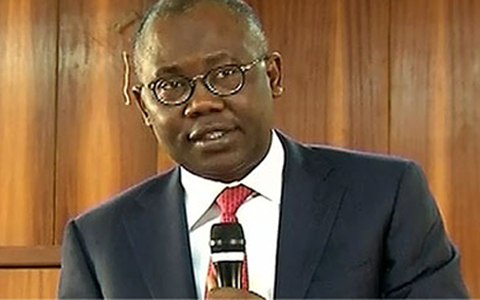Mohammed Adoke, the Attorney General of the Federal Republic disclosed to the United Nations Human Rights Council in Geneva, Switzerland that Nigerians do not embrace same sex marriage and it will not be welcomed in the country.
Mohammed Adoke, SAN, said “Nigeria does not accept recommendation of some countries on same sex marriage, because it is against its national values. Recent polling data suggests that 92 percent of Nigerians support the Anti Same-Sex Marriage Bill passed by the Senate.
“The Marriage Act defines marriage as a relationship between a man and a woman. Christianity and Islam, which are the major religions in Nigeria, also recognize marriage as relationship between a man and woman. Same-sex marriage is not in the culture of Nigerians. intimate and gender minorities are not visible in Nigeria and there is no officially registered association of gays and lesbians. In writing this report, a consultation and validation process was held with various stakeholders where the issue of same-sex marriage was brought up, and the general view of the participants was that same-sex marriage was not a human rights issue in Nigeria.”
Also speaking on the security challenges in the country, Mr Adoke said Boko Haram was a result of foreign elements.
He said, “Nigeria is experiencing the impact of externally-induced internal security challenges, manifesting in activities of militant insurgents and organised crime groups which has led to the violation of the human rights of many Nigerians. To address the problem, the government has adopted constitutional measures which include the “declaration of a state of emergency” in the states of Adamawa, Borno and Yobe of the North-East Nigeria, where the insurgents have their base. As a result, a Joint Task Force and a Special Task Force have been deployed with the required legislative authorization to utilize rightsbased “Rules of Engagement” and “Operational Plans” in combating the insurgency.
“However, the Nigerian Government has kept open communication channels through activities of a Presidential Committee on Security Challenges towards working out a peaceful resolution of the crisis. Meanwhile, Government has already proscribed Boko Haram as well as the Jama-atu Ansa-ril Muslimi-na fi- Bila-dis Su-da-n and stipulated a 20-year jail term for anybody who aids or sponsors them in any manner whatsoever. The Government has also put in place an amnesty programme to dissuade terrorists and other extremists from violence.
“The Nigerian Government has taken other measures to improve security, including enactment of the Terrorism Prevention Act 2011 and its subsequent amendment in 2013 to broaden the scope of its application; development of a Counter Terrorism Strategy and creation of crisis management centre in the office of the National Security Adviser; coordination of enhanced capacity building for all security and intelligence outfits at both the strategic and tactical levels; the National Security Adviser coordinates efforts among the security and intelligence agencies to ensure protection of the human rights of all persons in counter terrorism operations. Human rights standards have been incorporated in the training curricula of all operatives and coordination of a security awareness programme for ministers and other functionaries of government.”

